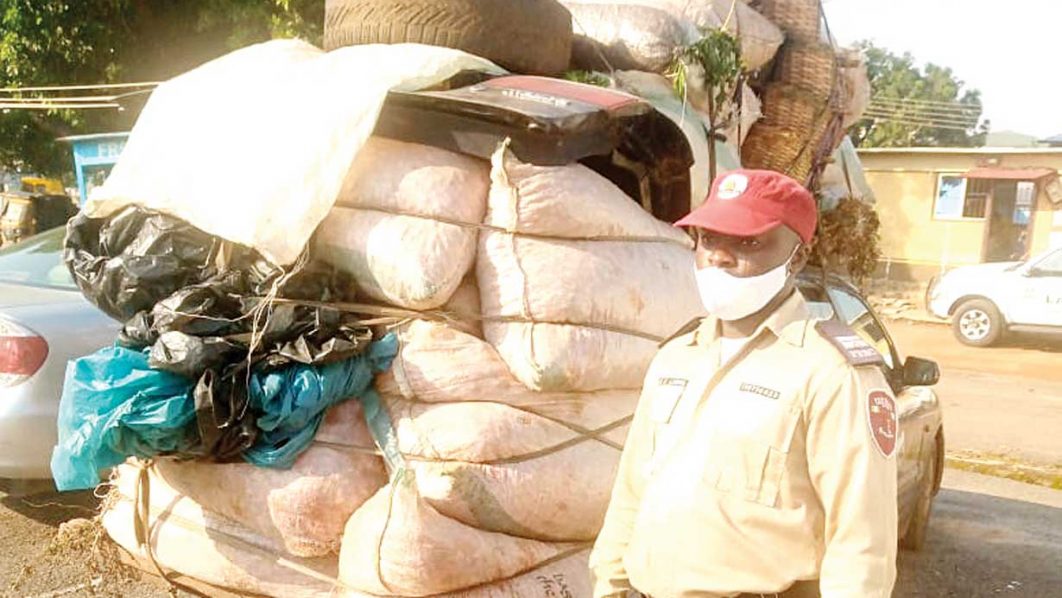
Although the Federal Road Safety Corps Law forbids overloading as it is recognised to be both a safety and cost concern, Lagos motorists have continued to defy the law.
Overloading of vehicles, which is rampant mostly at nights when traffic control officers have left the roads, has assumed a more worrisome trend.
Residents said no type of vehicles is spared as motorists have become more emboldened by either lack of enforcement or sensitisation.
A resident, Adebola Ademuyiwa, expressed worries that overloading thrives despite campaigns mounted by the National Department of Transport to discourage overloading.
He said apart from motorists, commercial tricyclists have also followed suit without minding the implication to other road users and their vehicles.
According to him, most drivers do not consider the implication of overloading as far as they can make money from it.
A commercial tri-cyclist, Daniel Omenka, who plies old Abeokuta road in Agege , said he made more money carrying wares than passengers.
Omenka, who overloaded his tricycle with 25 dozens of take-away packs for a dealer in Agege said he normally tips traffic officers when accosted.
Under normal circumstances, Omenka said he carries four passengers, at N100 each for the trip, which comes to N400, but the owners of the take away packs pay N2, 000 for him to transport the items.
According to him, operators prefer to carry loads in the afternoon when passengers are few at bus stops. Apart from tricyclists, commercial bus drivers, truck drivers and those operating interstate also carry overload.
A driver, who was recently arrested by officers of Federal Road Safety Corps (FRSC), confessed he would continue to get his vehicles overloaded because it is easy for him to ‘settle’ officers.
On why motorists overload their vehicles, a motorist, Goodluck Umeh, said economic consideration is a major driver.
According to him, although many drivers know the implication of overloading their vehicles, they want more money. Umeh, who drives a freight vehicle, expressed worries over the number of security officers, waiting to be settled on the road.
But an expert on road safety said overloading threatens road safety and contributes to fatal accidents on roads. He said an overloaded vehicle would not only put the driver at risk, but also passengers and other roads.
He said: “Overloading leads to higher maintenance and repair costs and shortens the life of a road, which in turn places additional burden on the state as well as law-abiding road users, who ultimately bear the costs of careless and inconsiderate overloading.
“Overloading is a safety hazard that leads to unnecessary loss of life, and also the rapid deterioration of our roads, resulting in increased maintenance and transportation costs.”
Reacting to the issue of overloading, Assistant Director, Public Affairs, Lagos State Traffic Management Authority (LASTMA), Filade Olumide, said the menace is dangerous to the driver and other road users and is unacceptable.
“It’s a violation of the traffic law and also an abuse of the vehicles involved. Such offenders are liable to be apprehended,” he added.
Also, the Lagos State Sector Commander of FRSC, Olusegun Ogungbemide, said the command has made several arrests for overloading.
He said: “As we are talking now, if you enter our premises, you will see the number of vehicles we have arrested for overloading. The ones that have not been caught are not as a result of negligence, but because the driver still lucky to escape.
“We have about 14 command units distributed all over Lagos. All of them are covering their areas.
“For those that are within our area of coverage, we don’t miss them, when we miss them, it is just for a while.”
On why they are not operating at night, Ogungbemide, said their operation is 24 hours, but they were also conscious of the security of their operatives.
He said: “You agree with me that we are not armed, if during the day we are being attacked, you should know that we have to put in some caution too. We operate at night. What we do most at night is not routine enforcement, it is more of an intervention.
“When we want to do such intervention, we need the support of armed security agencies. For the one that is routine is for rescue purposes. When there is need for rescue at night, we do 24 hours because our men are always on stand-by.”



